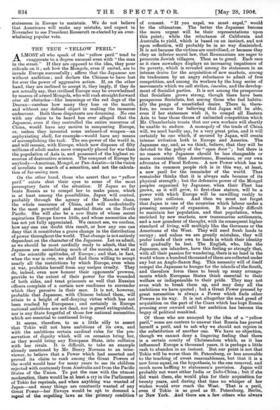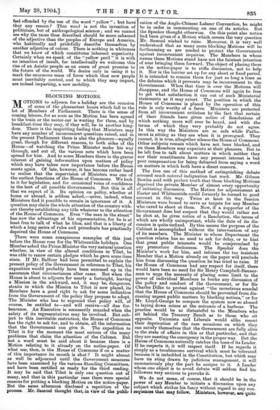A LMOST all who speak of the "yellow peril" tend to
exaggerate to a degree unusual even with "the man in the street." If they are opposed to the idea, they pour ridicule on it ; ask how the Mongols, even if united, are to invade Europe successfully ; affirm that the Japanese are without ambition ; and declare the Chinese to have lost for ever the power of aggressive action. If, on the other hand, they are inclined to accept it, they imply, if they do not actually say, that civilised Europe may be overwhelmed by masses of armed Mongols, who will rush straight forward over all obstacles—like lemmings or the red dogs of the Deccan—careless how many they lose on the march, and without any defined object in making the immense endeavour. Both these disputants are dreaming. No one with any claim to be heard has ever alleged that the Japanese, even if they controlled the entire resources of China, would have any motive in conquering Europe, or, unless they invented some unheard-of weapon—an asphyxiating shell, for example—would have any means of accomplishing the task. The sea-power of the world is, and will remain, with Europe, which now disposes of fifty millions of adult males more compactly placed for war than the population of Asia is, and possessed of the highest re- sources of destructive science. The conquest of Europe by anybody—American, Mongol, or Pan-Asiatic—is the vision of novelists in search of a sensation, and not the calcula- tion of far-seeing men.
On the other hand, those who assert that no "yellow peril" exists shut their eyes to some of the most peremptory facts of the situation. If Japan so far beats Russia as to compel her to make peace, which is at least among the possibilities, Japan will control, probably through the agency of the Manchu clans, the whole resources of China, and will undoubtedly be the most powerful and martial State on the North Pacific. She will also be a new State of whose secret aspirations Europe knows little, and whose necessities she has not yet fully appreciated. We cannot see, we confess, how any one can doubt this result, or how any one can deny that it constitutes a grave change in the distribution of power throughout the world. That change is not entirely dependent on the character of the Japanese. Let us admit, as we should be most cordially ready to admit, that the Japanese are assimilating much of the morale, as well as of the scientific aptitudes, of Europe ; and that, in fact, when the war is over, we shall find them willing to accept nearly all the restrictions by which Europe, even when at war, prohibits herself from any useless cruelty. They do, indeed, even now honour their opponents' prowess, provide to the extent of their power for the wounded of both sides, and treat prisoners so well that Russian officers complain of a certain new readiness to surrender which they perceive in their men. It is not, however, probable that Japanese, with Chinese behind them, will attain to a height of self-denying virtue which has not been reached by Europeans ; and certainly in Europe national ambitions are not dead, nor is greed extinguished, nor is any State forgetful of those few national necessities which are essential to continued living.
It seems, therefore, to us a little silly to assert that Tokio will not have ambitions of its own, and with the ambitions certain cardinal rules for the pre- servation of dignity which will on occasion bring her, as they ),vould bring any European State, into collision with her rivals. It is difficult, to take an example already mentioned by Mr. Henry Norman to an inter- viewer, to believe that a Power which had asserted and proved its claim to rank among the Great Powers of the world would bear for many years to see its children rejected with contumely from Australia and from the Pacific States of the Union. To put the case with the utmost moderation, there would be at least a cry in the Parliament of Tokio for reprisals, and when anything was wanted of Japan—and many things are constantly wanted of any Great Power—her Envoys would be apt to demand a repeal of the expelling laws as the primary condition of consent. "If you expel, we must expel," would be the ultimatum. The better the Japanese become the more urgent will be their representations upon this point; while the reluctance of California and Australia to yield, which is based on an instinct, and not upon reflection, will probably be in no way diminished. It is not because the victims are uncivilised, or because they obey an inferior moral law, that Roumanians are eager to persecute Jewish villagers. Then as to greed. Each race as it rises nowadays displays an increasing impatience of its poverty, which is revealed among its statesmen in an intense desire for the acquisition of new markets, among its tradesmen by an angry reluctance to admit of free competition, and among its workers by the long series of movements which we call strikes, enteute,s, and the develop- ment of Socialist parties. It is not among the prosperous that Socialism grows strong, though there have been prosperous Socialists, but among those who feel habitu- ally the pangs of unsatisfied desire. There is, there- fore, no reason for believing that Japan will be able, even if her statesmen wish it, to compel all Eastern Asia to bear those throes of unlimited competition which Mr. Chamberlain trusts that our own workers will shortly be unable to endure. A monopoly of the trade of China will, we need hardly say, be a very great prize, and it will certainly be one which, if secured by Japan, will create intense irritation both in Europe and America. The Japanese say, and, as we think, believe, that they will be devoted to the policy of the "open door "; but there is no reason why Japanese should be less changeable or more consistent than Americans, Russians, or our own advocates of Fiscal Reform. A new Power which has to make its common people rich is in this way, at least, a new peril for the remainder of the world. That remainder thinks that it is always safe because of its physical strength ; but the defensive power of the Mongol peoples organised by Japanese, when their Fleet has grown, as it will grow, to first-class stature, will be a power with which Europe will be unwilling rashly to come into collision. And then we must not forget that Japan is one of the countries which labour under a pressing necessity of expansion. It is already difficult to maintain her population, and that population, when enriched by new markets, new transmarine settlements, and a new grandeur of thought, with its consequent higher standard of living, will multiply like the Germans or the Americans of the West. They will need fresh lands to occupy ; and unless we are greatly mistaken, they will prefer lands of their own to lands in which their identity will gradually be lost. The English, who, like the Japanese, are islanders, have this feeling so strongly that, with all their passion for wandering, there is no land in the world where a hundred thousand of them are collected under any but an Anglo-Saxon flag. This necessity will of itself compel the Japanese to hunger for the islands of the South, and therefore force them to break up many arrange- ments which European States think essential to their welfare or indispensable to their pride. They may not even wish to break them up, and may deny all the ambitions we have quoted ; but a Great Power pressed by great necessities is always a Power which finds other Powers in its way. It is not altogether the mad greed of acquisition on the part of the Czars which has kept Russia pressing ever onward until her ambition has become the bogey of political mankind.
Of those who are annoyed by the idea of a "yellow peril," some are content to answer that Russia has proved herself a peril, and to ask why we should not rejoice in the substitution of another one. We have no objection, though we cannot deny a lingering feeling that there is a certain comity of Christendom which, as it has influenced Europe a thousand years, it is perhaps a little rash to abandon in an instant. But our point is not that Tokio will be worse than St. Petersburg, or less amenable to the teaching .of sweet reasonableness, but that it is a new force equal, on the hypothesis, to the one removed, and much more baffling to statesmen's prevision. Japan will probably not want either India or Indo-China ; but if she did want them, she would plan for their acquisition for twenty years, and during that time no whisper of her wishes would ever reach the West. That is a peril, even if Tokio is as good as St. Petersburg, Berlin, or New York. And there are a few others who always feel offended by the use of the word " yellow " ; but have they any reason ? That word is not the invention of politicians, but of anthropological science ; and we cannot see why the races thus described should be more ashamed of the adjective than the peoples of Europe and America, who habitually and pridefully describe themselves by another adjective of colour. There is nothing in whiteness that we know of which constitutes inherent superiority. Certainly when we speak of the "yellow peril" it is with no intention of insult, for intellectually we welcome this rise of an. Asiatic people as an omen of great promise to the future of the world. We desire only in using it to mark the enormous mass of force which that new people must inevitably control, and to which they may impart, are indeed. imparting, a new mobility.







































 Previous page
Previous page